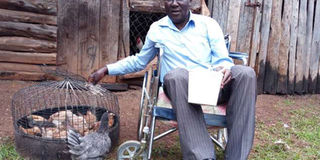I farm from my wheelchair and still get bumper harvest

Dominic Mbugua is basking in glory after being honoured for overcoming his handicap to grow crops and raise cows and chickens. PHOTO | NATION
What you need to know:
- Mbugua once worked as a soap maker at East Africa Industries and Colgate Palmolive but quit to go into business and later agribusiness. In a good week, he earns about Sh1,000 from selling sweet potato vines alone.
- Mbugua was honoured for being the best physically challenged farmer in the country, holds firmly on two photos that remind him of his achievement. In one of the photos, he is receiving a trophy from President Kenyatta.
- Kenneth Murimi, a government agricultural extension officer in Subukia, says the disabled, like other members of the society, can make good farmers as long as they get support from relatives and experts.
The Nakuru-Nyahururu Road offers an exciting ride because it is well-tarmacked.
Along the way are patches of green leafy maize and bean crops blooming planted at the onset of the rains.
Dominic Mbugua’s farm in Arash village, several kilometres away from the main road, however, is different from the others.
He grows bananas, napier grass, sweet potatoes, tomatoes, cassavas and keeps chickens and dairy cows.
But Mbugua stands out among other farmers in that that he farms on two-acres even though he is disabled and farms from his wheelchair.
“It looks like a difficult task but I have been farming for several years from my wheelchair,” says the 80-year-old.
He has about 120 banana plants, some of them of the tissue culture variety while others are indigenous type.
“The bananas are almost two years old, but I am yet to start selling. I eat them at home. I was advised by an agricultural officer to grow bananas because people do not plant them here. Most bananas eaten here are imported from Meru, Kisii and Kirinyaga,” he adds.
The farmer is wheeled to his farm every day, save on Sundays, to instruct his employees.
Getting to the farm, however, is not easy. Mbugua is wheeled to a certain point and from there he uses crutches.
He then sits on a chair and monitors the work.
“I have silage for my dairy cattle there; I have tomatoes here; bananas, napier grass up there, sweet potatoes vines and cassavas,” he says, showing his diversity.
DEFEATING THE ODDS
Mbugua sells cassava cuttings and sweet potato vines to fellow farmers at Sh2 each.
Mbugua once worked as a soap maker at East Africa Industries and Colgate Palmolive but quit to go into business and later agribusiness.
In a good week, he earns about Sh1,000 from selling sweet potato vines alone.
He has four cows; two that are being milked, a heifer and a bull. “I get 22 litres of milk from the two cows every day and sell a litre at Sh30, mostly to neighbours.”
“But I want to improve the breeds from indigenous to Friesian as I have been advised by experts,” he adds.
This year he started keeping indigenous chickens and has 150. He only sells cockerels at Sh750 each and keeps the hens for breeding.
He plants tomatoes on half-an-acre and earned about Sh100,000 between June and August. “I market my produce by word of mouth because that is the only way I know. At my age, I cannot use new technologies but word reaches traders and they come here,” says Mbugua.
He has earned accolades and last month, he was among farmers honoured by President Uhuru Kenyatta at the Nairobi show after coming top in a competition organised by Ministry of Agriculture and Elgon Kenya.
Mbugua was honoured for being the best physically challenged farmer in the country, holds firmly on two photos that remind him of his achievement. In one of the photos, he is receiving a trophy from President Kenyatta.
The other photo shows a certificate he was awarded after winning the award.
“I have been farming since 2006, but then I had both legs. I lost a leg in 2010, and the other in 2012, due to diabetes that I have been struggling with for decades.”
His main challenge is water, a matter he shared with the President. “I told him that my wish was to get water so that I can practice horticulture,” he recalls, adding, “The President told his aide to ensure I am assisted.”
However, he is already digging a borehole so that he can stop buying or relying on rain to sustain his farming.
Kenneth Murimi, a government agricultural extension officer in Subukia, says the disabled, like other members of the society, can make good farmers as long as they get support from relatives and experts.
“Government officers are always ready to support such people as long as they have the will,” says Murimi, adding those with physical challenges need more attention that include regular farm visits and follow ups. However, he notes that very few disabled people are engaging in farming due to the numerous challenges that include stigma, which often kills their morale.





